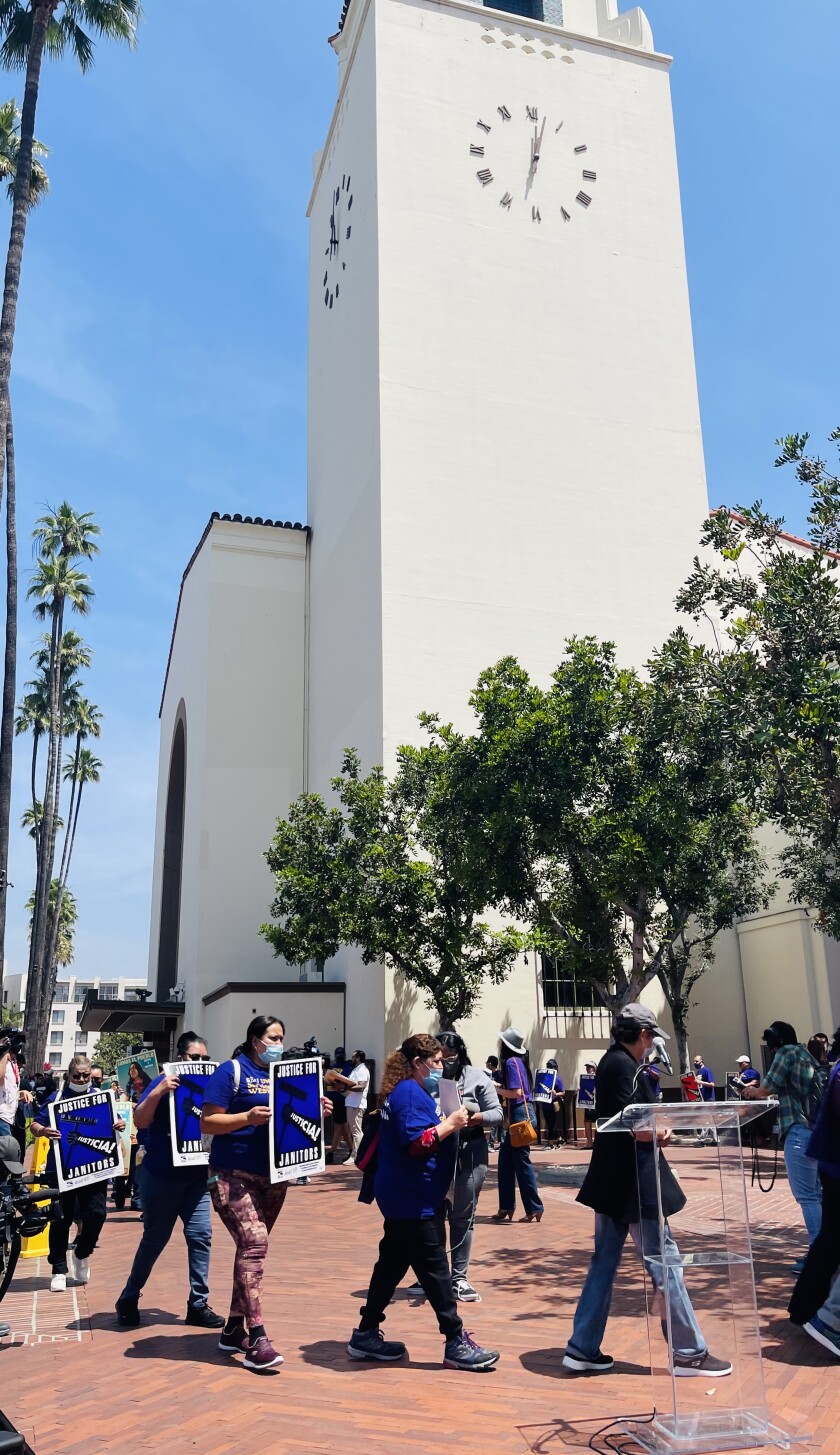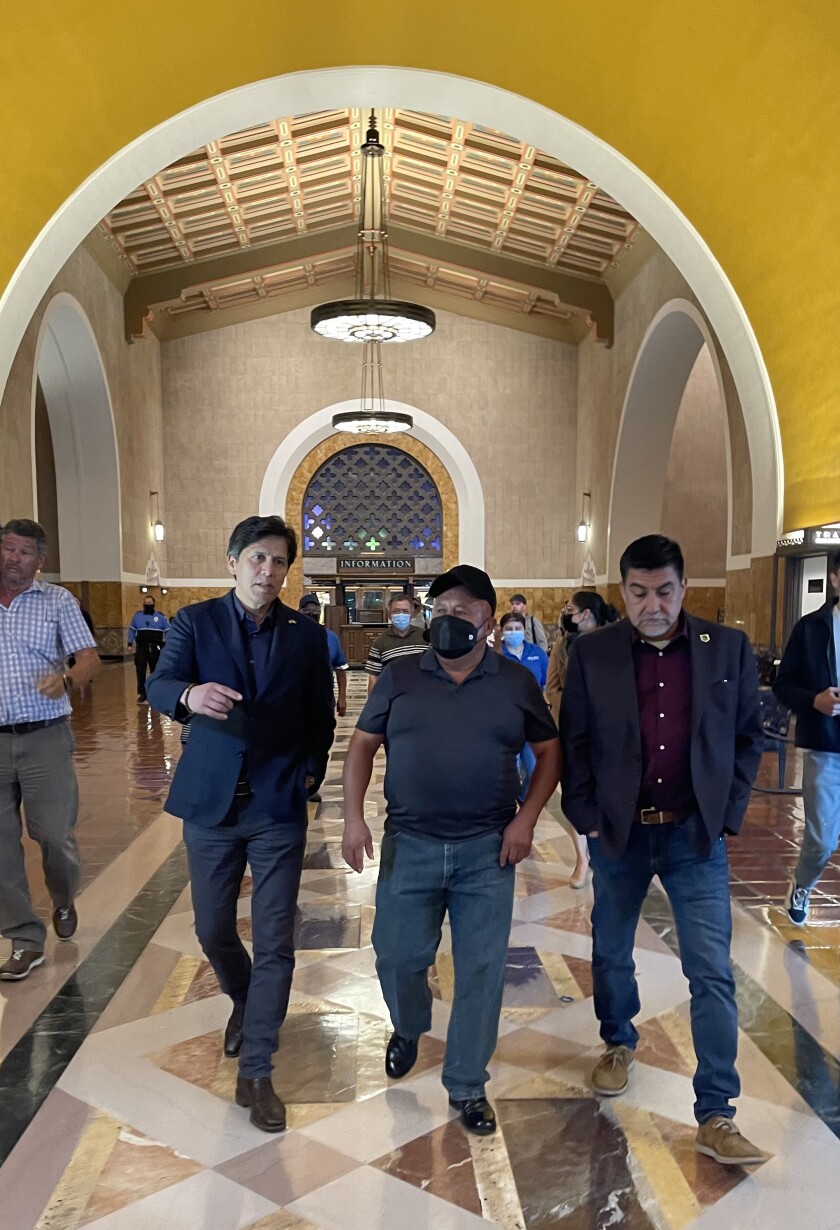More than a dozen janitors and workers who have been verbally and physically attacked at Union Station by homeless individuals will get better security, transit officials said this week.

Protesters gather at Union Station on Thursday demanding more security for the janitors that work there.
(Rachel Uranga)
Amid pressure from local officials and the union representing janitors, the Los Angeles County Metropolitan Transportation Agency said it will add security to Union Station and take more precautions, including locking public bathrooms as janitors clean them while posting a guard outside.
“This is a good first step,” said Alejandra Valles, chief of staff of SEIU United Service Workers West representing janitors working there. “But it is not a fix. This is a long-term problem that requires long-term solutions.”
During the pandemic, the iconic station became a shelter for homeless men and women, many with serious mental health issues.
Last week, the Los Angeles Times detailed widespread fear among low-wage workers at the transit hub who were often taunted and threatened while working. One janitor was beaten with a mallet in the bathroom last year where homeless men and women often bathe or use drugs.
In the first two months of this year, violent crime at the station has shot up 94% over the same period last year, and property crime has doubled.
“Safety remains our No. 1 priority,” Metro spokesperson David Sotero said in a statement late Thursday. He said the agency is working with law enforcement, social service providers and private security “to increase physical security at Union Station and discourage criminal activity.”
Metro stations, trains and buses have become a refuge for unhoused people, and the agency has spent millions trying to get them into shelter, but the problem persists. Union Station is ground zero. Its historic concourses are some of the few public places with bathrooms that are open all night downtown and sit about a mile from skid row, across from encampments on overpasses above the 101 Freeway.
Beginning on Monday, Metro will verify patrons have business at the station and kick out anyone engaging in illegal activity. The entrances at the south and north gardens where homeless people often rest will be closed. Mental health teams will deploy at the station, in addition to beefed up patrols. And all employees will receive quarterly training in deescalating tense and potentially dangerous situations.
LAPD Transit Services Bureau Deputy Chief Donald Graham would not say how many officers are deployed but said that the department has doubled its resources at Union Station and is now working with private security to coordinate responses.
On Thursday, the union held a rally in front of Union Station where dozens of janitors chanted “justice for janitors” as they marched beneath the clock tower at the picturesque entrance. Among them was Gerardo Mixcoatl, who stopped an attack on his colleague. The union is calling for better police response time, protocols in life-threatening events and other demands to improve security for the workers who clean the station.

Los Angeles councilman Kevin de Leon tours Union Station on April 29 with janitor Gerardo Mixcoatl, who was attacked in a bathroom there last year.
(Rachel Uranga)
Valles, who led the rally with a bullhorn, said that she hopes Metro will be more ambitious and not just seek to “discourage” criminal activity. Rather, she wants a zero-tolerance approach for criminal activity that threatens the livelihood of the immigrant workforce she represents and the riders that use the system.
“No one should have to go through what these essential workers are experiencing,” Councilman Kevin de León, a mayoral candidate, told the heads of Metro, Metrolink and Amtrak in a letter earlier this week. He asked the agencies, which jointly manage the location, to immediately address conditions by adding mental health teams, among other measures. Supervisor Janice Hahn, who is a Metro Board director, also expressed dismay, saying she supported the the workers’ calls for increased security and better protocols.
“What is happening to janitors at Union Station is unacceptable. No one should have to go through what these essential workers are experiencing,” she said.

